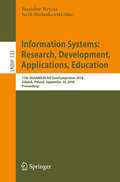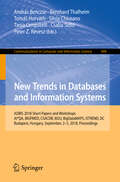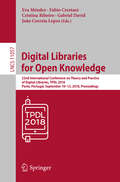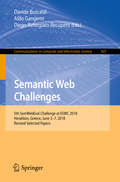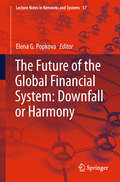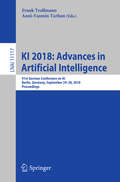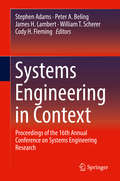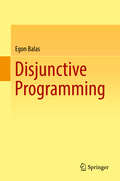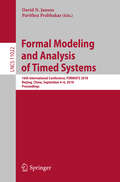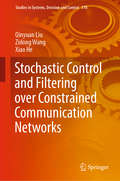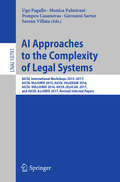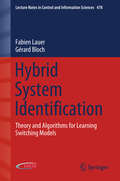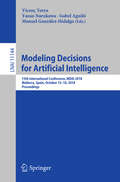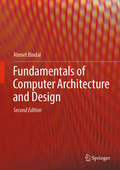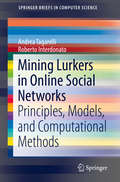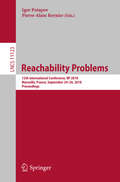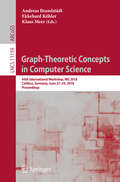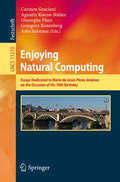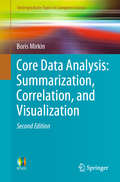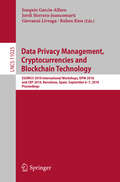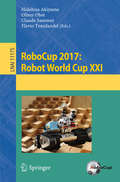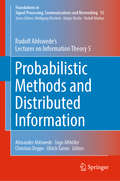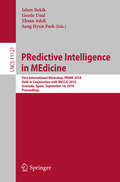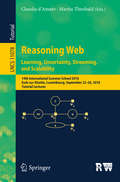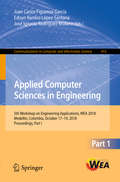- Table View
- List View
Information Systems: 11th SIGSAND/PLAIS EuroSymposium 2018, Gdansk, Poland, September 20, 2018, Proceedings (Lecture Notes in Business Information Processing #333)
by Stanisław Wrycza Jacek MaślankowskiThis book constitutes the refereed proceedings of the 11th SIGSAND/PLAIS EuroSymposium 2018 held in Gdansk, Poland, on September 20, 2018.The objective of the EuroSymposium on Systems Analysis and Design is to promote and develop high quality research on all issues related to information systems (IS) and in particular in systems analysis and design (SAND).The 14 papers presented in this volume were carefully reviewed and selected from 36 submissions. They were organized in topical sections named: systems development and engineering; systems acceptance and usability; internet of things and big data; and healthcare IT.
New Trends in Databases and Information Systems: Selected Papers Of The 17th East European Conference Adbis 2013 And Associated Satellite Events, Genoa, Italy, September 1-4 2013 (Advances In Intelligent Systems and Computing #241)
by Peter Z. Revesz Csaba Sidló Tania Cerquitelli Silvia Chiusano Tomáš Horváth Bernhard Thalheim András BenczúrThis book constitutes the thoroughly refereed short papers, workshops and doctoral consortium papers of the 22th European Conference on Advances in Databases and Information Systems, ADBIS 2018, held in Budapest, Hungary, in September 2018.The 20 full and the 4 short workshop papers as well as the 3 doctoral consortium papers were carefully reviewed and selected from 54 submissions to the workshops and 6 submissions to the doctoral consortium. Furthermore, there are 10 short papers included, which were accepted for the main conference. The papers are organized according to the 6 workshops and the doctoral consortium: ADBIS 2018 short papers; First Workshop on Advances on Big Data Management, Analytics, Data Privacy and Security, BigDataMAPS 2018; First International Workshop on New Frontiers on Meta-data Management and Usage, M2U 2018; First Citizen Science Applications and Citizen Databases Workshop, CSADB 2018; First International Workshop on Articial Intelligence for Question Answering, AI*QA 2018; First International Workshop on BIG Data Storage, Processing and Mining for Personalized MEDicine, BIGPMED 2018; First Workshop on Current Trends in Contemporary Information Systems and Their Architectures, ISTREND 2018; Doctoral Consortium.
Digital Libraries for Open Knowledge: 22nd International Conference on Theory and Practice of Digital Libraries, TPDL 2018, Porto, Portugal, September 10–13, 2018, Proceedings (Lecture Notes in Computer Science #11057)
by Eva Méndez Fabio Crestani Cristina Ribeiro Gabriel David João Correia LopesThis book constitutes the proceedings of the 22nd International Conference on Theory and Practice of Digital Libraries, TPDL 2018, held in Porto, Portugal, in September 2018. The 51 full papers, 17 short papers, and 13 poster and tutorial papers presented in this volume were carefully reviewed and selected from 81 submissions. The general theme of TPDL 2018 was Digital Libraries for Open Knowledge. The papers present a wide range of the following topics: Metadata, Entity Disambiguation, Data Management, Scholarly Communication, Digital Humanities, User Interaction, Resources, Information Extraction, Information Retrieval, Recommendation.
Semantic Web Challenges: 5th SemWebEval Challenge at ESWC 2018, Heraklion, Greece, June 3–7, 2018, Revised Selected Papers (Communications in Computer and Information Science #927)
by Davide Buscaldi Aldo Gangemi Diego Reforgiato RecuperoThis book constitutes the thoroughly refereed post conference proceedings of the 4th edition of the Semantic Web Evaluation Challenge, SemWebEval 2018, co-located with the 15th European Semantic Web conference, held in Heraklion, Greece, in June 2018.This book includes the descriptions of all methods and tools that competed at SemWebEval 2018, together with a detailed description of the tasks, evaluation procedures and datasets. The 18 revised full papers presented in this volume were carefully reviewed and selected from 24 submissions. The contributions are grouped in the areas: the mighty storage challenge; open knowledge extraction challenge; question answering over linked data challenge; semantic sentiment analysis.
The Future of the Global Financial System: Downfall or Harmony (Lecture Notes in Networks and Systems #57)
by Elena G. PopkovaThis book gathers the best papers presented at the conference “The Future of the Global Financial System: Downfall or Harmony”, which took place in Limassol, Cyprus on April 13-14, 2018. Organized by the Institute of Scientific Communications (Volgograd, Russia), the conference chiefly focused on reassessing the role and meaning of the global financial system in the modern global economy in light of the crisis that began in 2008 and can still be observed in many countries, and on developing conceptual and applied recommendations on spurring the development of the global financial system. All works underwent peer-review and conform to strict criteria, including a high level of originality (more than 90%), elements of scientific novelty, contribution to the development of economic science, and broad possibilities for practical application. The target audience of this scientific work includes postgraduates, lecturers at higher educational establishments, and researchers studying the modern global financial system. Based on the authors’ conclusions and results, readers will be equipped to pursue their own scientific research. The topics addressed include (but are not limited to) the following issues, which are interesting for modern economic science and practice: financial globalization, the role of finances in the global economy, perspectives of transition in the financial system from part of the infrastructure to a new vector of development in the global economy in the 21st century, reasons for the crisis of the modern financial system and ways of overcoming it, problems and perspectives regarding the harmonization of the global financial system, and scenarios of development for the global financial system. The content is divided into the following parts: development of financial systems at the micro-, meso- and macro-levels, financial infrastructure of the modern economy, legal issues of development of the modern financial system, and management of the global financial system.
KI 2018: 41st German Conference on AI, Berlin, Germany, September 24–28, 2018, Proceedings (Lecture Notes in Computer Science #11117)
by Frank Trollmann Anni-Yasmin TurhanThis book constitutes the refereed proceedings of the 41st German Conference on Artificial Intelligence, KI 2018, held in Berlin, Germany, in September 2018. The 20 full and 14 short papers presented in this volume were carefully reviewed and selected from 65 submissions. The book also contains one keynote talk in full paper length. The papers were organized in topical sections named: reasoning; multi-agent systems; robotics; learning; planning; neural networks; search; belief revision; context aware systems; and cognitive approach.
Systems Engineering in Context: Proceedings of the 16th Annual Conference on Systems Engineering Research
by William T. Scherer James H. Lambert Stephen Adams Peter A. Beling Cody H. FlemingThis volume chronicles the 16th Annual Conference on System Engineering Research (CSER) held on May 8-9, 2018 at the University of Virginia, Charlottesville, Virginia, USA. The CSER offers researchers in academia, industry, and government a common forum to present, discuss, and influence systems engineering research. It provides access to forward‐looking research from across the globe, by renowned academicians as well as perspectives from senior industry and government representatives. Co‐founded by the University of Southern California and Stevens Institute of Technology in 2003, CSER has become the preeminent event for researchers in systems engineering across the globe. Topics include though are not limited to the following: Systems in context: · Formative methods: requirements · Integration, deployment, assurance · Human Factors · Safety and Security Decisions/ Control & Design; Systems Modeling: · Optimization, Multiple Objectives, Synthesis · Risk and resiliency · Collaborative autonomy · Coordination and distributed decision-making Prediction: · Prescriptive modeling; state estimation · Stochastic approximation, stochastic optimization and control Integrative Data engineering: · Sensor Management · Design of Experiments
Disjunctive Programming
by Egon BalasDisjunctive Programming is a technique and a discipline initiated by the author in the early 1970's, which has become a central tool for solving nonconvex optimization problems like pure or mixed integer programs, through convexification (cutting plane) procedures combined with enumeration. It has played a major role in the revolution in the state of the art of Integer Programming that took place roughly during the period 1990-2010. The main benefit that the reader may acquire from reading this book is a deeper understanding of the theoretical underpinnings and of the applications potential of disjunctive programming, which range from more efficient problem formulation to enhanced modeling capability and improved solution methods for integer and combinatorial optimization. Egon Balas is University Professor and Lord Professor of Operations Research at Carnegie Mellon University's Tepper School of Business.
Formal Modeling and Analysis of Timed Systems: 16th International Conference, FORMATS 2018, Beijing, China, September 4–6, 2018, Proceedings (Lecture Notes in Computer Science #11022)
by David N. Jansen Pavithra PrabhakarThis book constitutes the refereed proceedings of the 16th International Conference on Formal Modeling and Analysis of Timed Systems, FORMATS 2018, held in Beijing, China, in September 2018. The 14 papers presented in this volume were carefully reviewed and selected from 29 submissions. The papers are organized in the following topical sections: invited papers, temporal logics, distributed timed systems, behavioral equivalences, timed words, and continuous dynamical systems. The aim of FORMATS is to promote the study of fundamental and practical aspects of timed systems, and to bring together researchers from different disciplines that share interests in modeling and analysis of timed systems and, as a generalization, hybrid systems.
Stochastic Control and Filtering over Constrained Communication Networks (Studies in Systems, Decision and Control #178)
by Qinyuan Liu Zidong Wang Xiao HeStochastic Control and Filtering over Constrained Communication Networks presents up-to-date research developments and novel methodologies on stochastic control and filtering for networked systems under constrained communication networks. It provides a framework of optimal controller/filter design, resilient filter design, stability and performance analysis for the systems considered, subject to various kinds of communication constraints, including signal-to-noise constraints, bandwidth constraints, and packet drops. Several techniques are employed to develop the controllers and filters desired, including:recursive Riccati equations;matrix decomposition;optimal estimation theory; andmathematical optimization methods.Readers will benefit from the book’s new concepts, models and methodologies that have practical significance in control engineering and signal processing. Stochastic Control and Filtering over Constrained Communication Networks is a practical research reference for engineers dealing with networked control and filtering problems. It is also of interest to academics and students working in control and communication networks.
AI Approaches to the Complexity of Legal Systems: International Workshops Aicol-i/ivr-xxiv, Beijing, China, September 19, 2009 And Aicol-ii/jurix 2009, Rotterdam, The Netherlands, December 16, 2009 Revised Selected Papers (Lecture Notes in Computer Science #6237)
by Ugo Pagallo Monica Palmirani Pompeu Casanovas Giovanni Sartor Serena VillataThis book includes revised selected papers from five International Workshops on Artificial Intelligence Approaches to the Complexity of Legal Systems, AICOL VI to AICOL X, held during 2015-2017: AICOL VI in Braga, Portugal, in December 2015 as part of JURIX 2015; AICOL VII at EKAW 2016 in Bologna, Italy, in November 2016; AICOL VIII in Sophia Antipolis, France, in December 2016; AICOL IX at ICAIL 2017 in London, UK, in June 2017; and AICOL X as part of JURIX 2017 in Luxembourg, in December 2017.The 37 revised full papers included in this volume were carefully reviewed and selected form 69 submissions. They represent a comprehensive picture of the state of the art in legal informatics. The papers are organized in six main sections: legal philosophy, conceptual analysis, and epistemic approaches; rules and norms analysis and representation;legal vocabularies and natural language processing; legal ontologies and semantic annotation; legal argumentation; and courts, adjudication and dispute resolution.
Hybrid System Identification: Theory and Algorithms for Learning Switching Models (Lecture Notes in Control and Information Sciences #478)
by Fabien Lauer Gérard BlochHybrid System Identification helps readers to build mathematical models of dynamical systems switching between different operating modes, from their experimental observations. It provides an overview of the interaction between system identification, machine learning and pattern recognition fields in explaining and analysing hybrid system identification. It emphasises the optimization and computational complexity issues that lie at the core of the problems considered and sets them aside from standard system identification problems. The book presents practical methods that leverage this complexity, as well as a broad view of state-of-the-art machine learning methods.The authors illustrate the key technical points using examples and figures to help the reader understand the material. The book includes an in-depth discussion and computational analysis of hybrid system identification problems, moving from the basic questions of the definition of hybrid systems and system identification to methods of hybrid system identification and the estimation of switched linear/affine and piecewise affine models. The authors also give an overview of the various applications of hybrid systems, discuss the connections to other fields, and describe more advanced material on recursive, state-space and nonlinear hybrid system identification.Hybrid System Identification includes a detailed exposition of major methods, which allows researchers and practitioners to acquaint themselves rapidly with state-of-the-art tools. The book is also a sound basis for graduate and undergraduate students studying this area of control, as the presentation and form of the book provides the background and coverage necessary for a full understanding of hybrid system identification, whether the reader is initially familiar with system identification related to hybrid systems or not.
Modeling Decisions for Artificial Intelligence: 15th International Conference, MDAI 2018, Mallorca, Spain, October 15–18, 2018, Proceedings (Lecture Notes in Computer Science #11144)
by Vicenç Torra Yasuo Narukawa Isabel Aguiló Manuel González-HidalgoThis book constitutes the proceedings of the 15th International Conference on Modeling Decisions for Artificial Intelligence, MDAI 2018, held in Mallorca, Spain, in October 2018.The 24 papers presented in this volume were carefully reviewed and selected from 43 submissions. The book also contains one invited talk in full paper length. The papers were organized in topical sections named: aggregation operators, fuzzy measures and integrals; decision making; clustering and classification; and data privacy and security.
Fundamentals of Computer Architecture and Design
by Ahmet BindalThis textbook provides semester-length coverage of computer architecture and design, providing a strong foundation for students to understand modern computer system architecture and to apply these insights and principles to future computer designs. It is based on the author’s decades of industrial experience with computer architecture and design, as well as with teaching students focused on pursuing careers in computer engineering. Unlike a number of existing textbooks for this course, this one focuses not only on CPU architecture, but also covers in great detail in system buses, peripherals and memories. This book teaches every element in a computing system in two steps. First, it introduces the functionality of each topic (and subtopics) and then goes into “from-scratch design” of a particular digital block from its architectural specifications using timing diagrams. The author describes how the data-path of a certain digital block is generated using timing diagrams, a method which most textbooks do not cover, but is valuable in actual practice. In the end, the user is ready to use both the design methodology and the basic computing building blocks presented in the book to be able to produce industrial-strength designs.
Mining Lurkers in Online Social Networks: Principles, Models, and Computational Methods (SpringerBriefs in Computer Science)
by Andrea Tagarelli Roberto InterdonatoThis SpringerBrief brings order to the wealth of research studies that contribute to shape our understanding of on-line social networks (OSNs) lurking phenomena. This brief also drives the development of computational approaches that can be effectively applied to answer questions related to lurking behaviors, as well as to the engagement of lurkers in OSNs. All large-scale online social networks (OSNs) are characterized by a participation inequality principle, i.e., the crowd of an OSN does not actively contribute, rather it takes on a silent role. Silent users are also referred to as lurkers, since they gain benefit from others' information without significantly giving back to the community. Nevertheless, lurkers acquire knowledge from the OSN, therefore a major goal is to encourage them to more actively participate. Lurking behavior analysis has been long studied in social science and human-computer interaction fields, but it has also matured over the last few years in social network analysis and mining. While the main target audience corresponds to computer, network, and web data scientists, this brief might also help increase the visibility of the topic by bridging different closely related research fields. Practitioners, researchers and students interested in social networks, web search, data mining, computational social science and human-computer interaction will also find this brief useful research material .
Reachability Problems: 12th International Conference, RP 2018, Marseille, France, September 24-26, 2018, Proceedings (Lecture Notes in Computer Science #11123)
by Igor Potapov Pierre-Alain ReynierThis book constitutes the refereed proceedings of the 12th International Conference on Reachability Problems, RP 2018, held in Marseille, France, in September 2018.The 11 full papers presented were carefully reviewed and selected from 21 submissions. The papers cover topics such as reachability for infinite state systems; rewriting systems; reachability analysis in counter/timed/cellular/communicating automata; Petri nets; computational aspects of semigroups, groups, and rings; reachability in dynamical and hybrid systems; frontiers between decidable and undecidable reachability problems; complexity and decidability aspects; predictability in iterative maps, and new computational paradigms.
Graph-Theoretic Concepts in Computer Science: 44th International Workshop, WG 2018, Cottbus, Germany, June 27–29, 2018, Proceedings (Lecture Notes in Computer Science #11159)
by Andreas Brandstädt Ekkehard Köhler Klaus MeerThis book constitutes the revised selected papers of the 44th International Workshop on Graph-Theoretic Concepts in Computer Science, WG 2018, held in Cottbus, Germany, in June 2018. The 30 full papers presented in this volume were carefully reviewed and selected from 66 submissions. They cover a wide range of areas, aiming at connecting theory and applications by demonstrating how graph-theoretic concepts can be applied in various areas of computer science. Another focus is on presenting recent results and on identifying and exploring promising directions of future research.
Enjoying Natural Computing: Essays Dedicated to Mario de Jesús Pérez-Jiménez on the Occasion of His 70th Birthday (Lecture Notes in Computer Science #11270)
by Carmen Graciani Agustín Riscos-Núñez Gheorghe Păun Grzegorz Rozenberg Arto SalomaaThis Festschrift is in honor of Mario de Jesús Pérez-Jiménez, Professor in the Department of Computer Science of University of Seville, Spain, on the occasion of his 70th birthday. The title of this volume reflects both his main research area, viz., Natural Computing, and the guiding principle of his functioning: “once you choose to do something, enjoy doing it".The respect that Professor Mario de Jesús Pérez-Jiménez enjoys in the scientific community was well demonstrated by the enthusiastic response received to the request to contribute to this book. The contributions by more than 70 authors from 15 countries cover a wide spectrum of research areas and reflect well the broad range of research interests of Professor Mario de Jesús Pérez-Jiménez. The research areas presented in this Festschrift include membrane computing, spiking neural networks, phylogenetic networks, ant colonies optimization, workbench for biocomputing, reaction systems, entropy of computation, rewriting systems, and insertion-deletion systems.
Core Data Analysis: Summarization, Correlation And Visualization (Undergraduate Topics in Computer Science)
by Boris MirkinThis text examines the goals of data analysis with respect to enhancing knowledge, and identifies data summarization and correlation analysis as the core issues. Data summarization, both quantitative and categorical, is treated within the encoder-decoder paradigm bringing forward a number of mathematically supported insights into the methods and relations between them. Two Chapters describe methods for categorical summarization: partitioning, divisive clustering and separate cluster finding and another explain the methods for quantitative summarization, Principal Component Analysis and PageRank.
Data Privacy Management, Cryptocurrencies and Blockchain Technology: Esorics 2018 International Workshops, Dpm 2018 And Cbt 2018, Barcelona, Spain, September 6-7, 2018, Proceedings (Lecture Notes in Computer Science #11025)
by Ruben Rios Giovanni Livraga Jordi Herrera-Joancomartí Joaquin Garcia-AlfaroThis book constitutes the refereed conference proceedings of the 2nd International Workshop on Cryprocurrencies and Blockchain Technology, CBT 2018, and the 13thInternational Workshop on Data Privacy Management, DPM 2018, on conjunction with the 23nd European Symposium on Research in Computer Security, ESORICS 2018, held in Barcelona, Spain, in September 2018. From the CBT Workshop 7 full and 8 short papers out of 39 submissions are included. The selected papers cover aspects of identity management, smart contracts, soft- and hardforks, proof-of-works and proof of stake as well as on network layer aspects and the application of blockchain technology for secure connect event ticketing. The DPM Workshop received 36 submissions from which 11 full and 5 short papers were selected for presentation. The papers focus on challenging problems such as translation of high-level buiness goals into system level privacy policies, administration of sensitive identifiers, data integration and privacy engineering.
RoboCup 2017: Robot World Cup XXI (Lecture Notes in Computer Science #11175)
by Hidehisa Akiyama Oliver Obst Claude Sammut Flavio TonidandelThis book includes the post-conference proceedings of the 21st RoboCup International Symposium, held in Nagoya, Japan, in September 2017. The 33 full revised papers and 9 papers from the winning teams presented were carefully reviewed and selected from 58 submissions. The papers are orginazed on topical sections on Robotics, Artificial intelligence, Environment perception, State estimation and much more.
Probabilistic Methods and Distributed Information: Rudolf Ahlswede’s Lectures on Information Theory 5 (Foundations in Signal Processing, Communications and Networking #15)
by Rudolf Ahlswede Alexander Ahlswede Ingo Althöfer Christian Deppe Vladimir Blinovsky Ulrich Tamm Holger Boche Ulrich Krengel Ahmed MansourThe fifth volume of Rudolf Ahlswede’s lectures on Information Theory focuses on several problems that were at the heart of a lot of his research. One of the highlights of the entire lecture note series is surely Part I of this volume on arbitrarily varying channels (AVC), a subject in which Ahlswede was probably the world's leading expert. Appended to Part I is a survey by Holger Boche and Ahmed Mansour on recent results concerning AVC and arbitrarily varying wiretap channels (AVWC). After a short Part II on continuous data compression, Part III, the longest part of the book, is devoted to distributed information. This Part includes discussions on a variety of related topics; among them let us emphasize two which are famously associated with Ahlswede: "multiple descriptions", on which he produced some of the best research worldwide, and "network coding", which had Ahlswede among the authors of its pioneering paper. The final Part IV on "Statistical Inference under Communication constraints" is mainly based on Ahlswede’s joint paper with Imre Csiszar, which received the Best Paper Award of the IEEE Information Theory Society. The lectures presented in this work, which consists of 10 volumes, are suitable for graduate students in Mathematics, and also for those working in Theoretical Computer Science, Physics, and Electrical Engineering with a background in basic Mathematics. The lectures can be used either as the basis for courses or to supplement them in many ways. Ph.D. students will also find research problems, often with conjectures, that offer potential subjects for a thesis. More advanced researchers may find questions which form the basis of entire research programs.
PRedictive Intelligence in MEdicine: First International Workshop, PRIME 2018, Held in Conjunction with MICCAI 2018, Granada, Spain, September 16, 2018, Proceedings (Lecture Notes in Computer Science #11121)
by Islem Rekik Gozde Unal Ehsan Adeli Sang Hyun ParkThis book constitutes the refereed proceedings of the First International Workshop on PRedictive Intelligence in MEdicine, PRIME 2018, held in conjunction with MICCAI 2018, in Granada, Spain, in September 2018. The 20 full papers presented were carefully reviewed and selected from 23 submissions. The main aim of the workshop is to propel the advent of predictive models in a broad sense, with application to medical data. Particularly, the workshop will admit papers describing new cutting-edge predictive models and methods that solve challenging problems in the medical field.
Reasoning Web. Learning, Uncertainty, Streaming, and Scalability: 14th International Summer School 2018, Esch-sur-Alzette, Luxembourg, September 22–26, 2018, Tutorial Lectures (Lecture Notes in Computer Science #11078)
by Claudia D’Amato Martin TheobaldThis volume contains lecture notes of the 14th Reasoning Web Summer School (RW 2018), held in Esch-sur-Alzette, Luxembourg, in September 2018. The research areas of Semantic Web, Linked Data, and Knowledge Graphs have recently received a lot of attention in academia and industry. Since its inception in 2001, the Semantic Web has aimed at enriching the existing Web with meta-data and processing methods, so as to provide Web-based systems with intelligent capabilities such as context awareness and decision support. The Semantic Web vision has been driving many community efforts which have invested a lot of resources in developing vocabularies and ontologies for annotating their resources semantically. Besides ontologies, rules have long been a central part of the Semantic Web framework and are available as one of its fundamental representation tools, with logic serving as a unifying foundation. Linked Data is a related research area which studies how one can make RDF data available on the Web and interconnect it with other data with the aim of increasing its value for everybody. Knowledge Graphs have been shown useful not only for Web search (as demonstrated by Google, Bing, etc.) but also in many application domains.
Applied Computer Sciences in Engineering: 5th Workshop on Engineering Applications, WEA 2018, Medellín, Colombia, October 17-19, 2018, Proceedings, Part I (Communications in Computer and Information Science #915)
by José Ignacio Rodriguez-Molano Eduyn Ramiro López-Santana Juan Carlos Figueroa-GarcíaThis two-volume set (CCIS 915 and CCIS 916) constitutes the refereed proceedings of the 5th Workshop on Engineering Applications, WEA 2018, held in Medellín, Colombia, in October 2018. The 50 revised full papers presented in this volume were carefully reviewed and selected from126 submissions. The papers are organized in topical sections such as computer science; computational intelligence; simulation systems; software engineering; power and energy applications.
